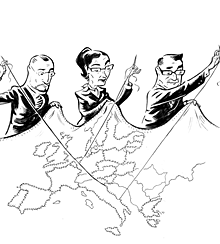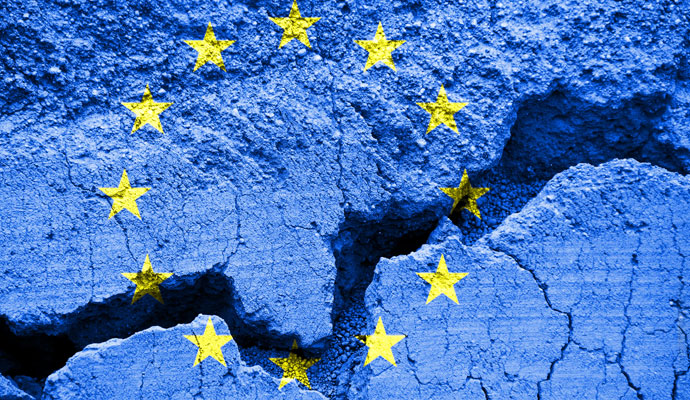The Business Case for the European Union
To corporate leaders, this year’s economic crisis is a sign that a more unified Europe is a solution, not a problem.
(originally published by Booz & Company)As the State of the European Union conference convened in Brussels in May 2012, the economic news was grim. An electoral crisis in Greece, a banking crisis in Spain and Portugal, and a bitterly fought election in France had all taken place within the previous few weeks. Unemployment was rising in many countries from already high levels. And there was a flood of public commentary about European economic problems — bemoaning the future of the euro, anticipating the loss of countries from the European Union, and predicting immense fallout in the form of further unemployment, defaults, and recession.
Given these conditions, one would naturally expect pessimism at the conference, but what we heard instead was reasoned optimism and a commitment to European unity. The 400 business leaders who came together were CEOs and other senior executives of major companies in a wide variety of industries. Most were European, but a sizable number came from North America and emerging economies like Brazil, Russia, India, and China. All were long-standing investors of money, attention, and effort in European customers and Europe’s future. Nearly all of them (as well as the 2,000 executives we surveyed before the conference) felt that there was far more to gain from bringing Europe closer together than from letting it fall further apart.
If these individuals are typical of their peers, then the desire of business leaders is simple and clear. They want more Europe, not less. They want more weight given to leadership at the European level, and stronger decision making in Brussels. They are even willing to play a role in helping the European Union survive. They see the E.U. as a solution, not a problem.
This vote of confidence comes from a business community that is usually eager for less government, and prone to complain about the excesses of regulation. The perspective is also at odds with the views of many national politicians, significant portions of the electorate, and much of the press. That’s why it is important to hear it. Despite the uncertainties, and the weakness that the crisis has exposed in the current design of the European Union, business leaders do not want the system to break apart, and they do not think fragmentation is inevitable.
Nor do they want stasis. They believe in making political and economic changes — to promote regional competitiveness, guarantee level playing fields, and build more centralized governance structures, including a supranational federal executive. If those changes, and others like them, can take place, Europe will have the capability to recover and thrive.
Crises tend to arise because important questions are not adequately addressed. Viewed in this way, the euro crisis is welcome. It is forcing leaders and citizens to look closely at reforms that have been held back or put off for years. Whatever one may think about the current difficulties, the goal of future efforts should be a stronger, more cohesive Europe — not a lesser, weaker one.
The Case for Optimism
In making the argument that the European Union and the euro will hold, business leaders reaffirmed the reason the E.U. was created in the first place. Formulated since its beginnings as a common market, the European project has been driven by the need to create a single economic entity — as the only way to survive in an increasingly competitive global business environment. Companies from the United States, the BRICS (Brazil, Russia, India, China, and South Africa), and other emerging economies, such as Indonesia, Mexico, and Turkey, are all competing globally and catering to customers around the world, including, of course, in Europe.
Having Europe-wide economic synergy creates stronger corporate players, leads to lower-priced goods for consumers, and rewards innovation. Conversely, European economic fragmentation could subject companies — along with their managers, employees, unions, and regulators — to greater competitive pressures and hurdles. The virtues a single market offers are a necessity just to stay in the game. No economic crisis, no matter how severe, can do away with that logic.
The European countries that have so far weathered the storm are the ones that most benefit from global commerce: the Scandinavian countries; the Benelux countries; some of the new E.U. countries, such as Poland, Slovenia, and the Czech and Slovakian republics; and Germany, whose economic health has been furthered by its ability to trade across Europe in a single currency. The countries in trouble are those that are not globally competitive. Government leaders of European countries all agree that increased economic competitiveness is a must; they might disagree about how best to generate it, but not about its importance.
One recent side effect of the crisis has been to raise the intensity of proposals for convergence and reform. Suddenly, there is an enormous push for reconciling European labor practices (not making them identical among countries, but bringing them closer together). The goal of a single E.U. patent, which has been held back for decades by fruitless negotiation, will reportedly soon be realized. The power of cross-national European financial markets has also been boosted by the crisis; several national governments that have previously resisted convergence now see the European Central Bank (ECB) and euro bonds as signposts to a desirable future (even though they require greater economic, fiscal, and political convergence and greater enforcement at the center). A noteworthy example of the willingness to change under economic pressure was seen in Belgium in November 2011: The downgrading of the country’s national debt by Moody’s led the Belgians to form a government in one weekend, something they had refused to do for the previous 18 months.
Indeed, the countries in trouble are those that did not play fair with the E.U. project’s assets. They borrowed heavily in euros, drawing on credibility that was derived from the ECB (and its member banks, especially the Bundesbank), but then did not respect the agreed-upon 3 percent budget deficit figure, and did not keep their commitments to the fiscal compact. France, for example, increased its national debt during the 2000s (the first decade of the euro) from 60 to 90 percent of GDP. The liquidity crisis of 2008 suddenly exposed those countries that did not live within their means, and their borrowing rates soared. (For countries today, living within one’s means is generally regarded to mean holding a national debt of less than 60 percent of GDP.) The financial crisis that followed exposed the weaker European countries, which now must fall in line. The wake-up call was rude in some places, most notably in Greece. But in Europe overall, the backlash has been unexpectedly mild; public opinion allowed the Eurogroup to offer a recent rescue package to Spain of €100 billion (US$124.8 billion).
Despite the magnitude of the reforms that may be needed — including ways to manage the basic contradiction between a single currency and multiple decision-making sovereignties — the evidence suggests that Europe is ready to get its financial house in order. Some doubt remains about whether the reforms are rapid or broad enough to succeed, but the seriousness of the effort and the solidarity behind it are undeniable. Portugal, for example, has set an example for what it means to accept hardship in turnaround, with an eye on the post-crisis future and a heart regretting past excesses and admitting change is needed. The rescue package for Spain also fuels hope that European national governments can play as a team. Germany itself has shown how it is possible to return from a crisis — specifically the stress of reunification in the early 1990s — to become a vital global player. Strong management united with positive labor relations created a growth engine in Germany. This required great political will and leadership, but it happened — and it can happen elsewhere in Europe.
Another reason for optimism is the fact that Europe is still the world’s most innovative and competitive region. Each year, the business school INSEAD and the World Intellectual Property Organization (WIPO) publish a global innovation index, ranking countries by their capacity for innovation (as indicated by infrastructure, human capital, market sophistication, education institutions, and so on), and by their output of scientific knowledge and creative products and services. (See “The Innovativeness of Nations,” by Rob Norton, s+b, Spring 2012.) In 2012, the top 10 countries — Switzerland, Sweden, Singapore, Hong Kong, Finland, Denmark, the U.S., Canada, the Netherlands, and the U.K. — included six within Europe, and five in the European Union. Europe possesses some of the world’s best education institutions, which are fostering some of the world’s greatest basic and applied research. Investors remain very enthusiastic about the technological opportunities that Europe presents.
Our survey also found that business leaders recognize the potential of Europe’s consumer market. It may have a reputation for having barriers to foreign products and services, but in fact, Europe’s 550 million citizens are as open and cosmopolitan as the people in any other region. Particularly in recent years, Europeans have demonstrated a huge willingness to buy from other countries, with imports including hamburgers, digital technology, theme park concepts, airplanes, pharmaceuticals, and movies. Even France, which is often regarded as a “closed” country, is open for foreign acquisitions, albeit with a bit of noise from the government and unions. In the end, the barriers are reasonably low for countries wishing to sell to the European market.
Some see the diversity of European culture, and its multiple languages, as an inherent problem. But it is also the source of a core competence in the region: the ability to adapt offerings to the particular tastes and needs of local markets. McDonald’s learned to manage diversity in France. Airbus and SAP both built businesses as more adaptable, locally relevant counterparts to their U.S. rivals. Further, because of its long experience with democracy and representative government, Europe offers a comparatively stable legal environment for doing business. That is also one of the key reasons that Europe leads on environmental issues, sustainability, human rights, and other farsighted causes. Europe’s social consciousness is shared by its businesses, which supported, for example, the United Kingdom’s Bribery Act, now beginning to supplant the U.S. Foreign Corrupt Practices Act as the standard for this type of legislation. Europe is also actively promoting gender diversity for corporate boards, a reform that has been shown to lead to higher levels of performance, and that is expected to ripple out globally.
The final reason we believe Europe will remain attractive to business is the next generation. European youth, despite the unemployment and economic hardship many are facing, remain committed to the European dream. It is not the same dream that their grandparents held, of a unified Europe as an insurance policy for peace. For today’s young people, the dream means mobility, equality, diversity, and prosperity. Many already have studied in several European countries (thanks to the Erasmus Programme), have received master’s degrees in other parts of Europe (thanks to the Bologna system of equivalences), and unashamedly profess more loyalty to Europe than to their national governments.
What Business Leaders Want
The business leaders at the conference were not naive about the challenges facing Europe. They recognized how much time and work it would take for national European governments to agree to transfer power to a federal government in Brussels. After all, it took more than 75 years (and a civil war) for the United States to form itself into a federal nation, and several centuries for Switzerland. By those standards, change in Europe, even if it takes a decade or two, will be rapid. Some difficult hurdles would have to be overcome, including undoing rules and practices that make business difficult in Europe — for example, the lack of flexibility in the workforce.
European business leaders naturally want Europe to continue to grow and prosper in an increasingly competitive global economy. Non-European business leaders want the same thing; they believe that a more accessible and open Europe will also be more prosperous, and help to generate still more prosperity throughout today’s complex world. In short, the business community believes in Europe. The birthplace of the Enlightenment — where intellectual and philosophical debates about federalism, economic models, democracy, and social justice have long dominated the public’s imagination — now has a rare opportunity to learn from its current problems. It can reinvent itself as a collaborative, prosperous, multilateral, and multispeed economy. That is the gift of this crisis; now we need to open it. ![]()
Author profiles:
- Robert Gogel is editor-in-chief of the annual conference the State of the European Union and CEO of Integreon, a supplier of integrated legal, research, and business support to corporations and law firms.
- Per-Ola Karlsson is a senior partner with Booz & Company based in Stockholm, and the managing director of the firm’s business in Europe.
- Ludo Van der Heyden is the Mubadala Professor of Corporate Governance and Strategy at INSEAD in Fontainebleau, France; Singapore; and Abu Dhabi.
- This article was adapted in part from Per-Ola Karlsson, Bruno Lanvin, Ludo Van der Heyden, and Robert Gogel,“Revitalising the European Dream: A Corporate View — 2012 Edition,” Booz & Company, European Executive Council, and INSEAD white paper, 2012.




